A Light in the Window Read online
Page 24
A Royal manual, he concluded, or he'd eat his hat.
He went back to his room and closed the door. If Dooley could sleep through it, so could he.
All over town, green shoots poked from earth still damp from melting snow, and nearly everyone felt a shiver of delight at a certain fragrance in the air.
Easter morning had "turned off fair," as one villager said, and the various Mitford congregations poured out of church with new hearts.
On the lawn of the Presbyterians stood a wooden cross, massed with blooming vines, fern, galax, and woods moss. Dozens of potted white lilies lined the front walk of Lord's Chapel, and the Baptists draped their wayside pulpit with a banner proclaiming Hallelujah! The Methodists had chosen to peal their agreeable chimes at sunrise.
Uncle Billy Watson, according to the rector, had put the whole spirit of the morning in a nutshell. "I'm about t' lift off," the old man announced as he left the churchyard with a sprig of forsythia in his lapel.
Father Tim walked home with Dooley after the eleven o'clock, expecting to see their guest up and about. To that end, he had set the dining room table before the early service, using his grandmother's Haviland.
He found the ham sitting on the counter, loosely covered with foil, minus a vast chunk from one side. He looked under the lid of the greenbean casserole and saw that a full third of it was missing. A pop top from a Coke can lay in the sink.
He went up and knocked on her door. "Cousin Meg?"
No answer.
He knocked more loudly.
"Righto." He heard the bed creak.
"Happy Easter! Wouldn't you like to have lunch with us?"
"I've had it, if you don't mind."
He stood for a moment, rubbing his chin. Then he went downstairs, wrapped the ham, put it in the refrigerator, and said to Dooley, "Don't take your church clothes off. We're going to Mayor Cunningham's family Easter dinner, then we'll visit your grandpa."
Dooley looked at him approvingly. "It's about time we went somewhere. We never go nowhere."
"There's a first time for everything," he said, admiring the way Dooley had turned himself out this morning.
"Good heavens, Timothy, who answered the phone while you were out? Talullah Bankhead?"
"My cousin Meg. From Ireland."
"She doesn't sound terribly Irish to me," Cynthia declared.
"Schooled in America."
"Um. There for a visit?"
"Yes. She's a writer."
"Oh, dear!"
"Doing a book on descendants of the Potato Famine emigrants."
"Are you one?"
"No, but she says these mountains are full of them."
"How long will your cousin be with you?"
"I don't know."
"You don't know?"
"No."
"Oh."
"And how is the city?" he asked, changing the subject.
"Grimy. Intoxicating. Tedious. How's Mitford?"
"Quiet. Clean. Comforting. And a dash boring, to tell the blessed truth."
"Boring?"
"Because my neighbor isn't here. I haven't had a good laugh since she left."
She proceeded to tell him a joke so corny that Uncle Billy would have flatly refused it for his own collection.
He laughed, lying back against the sofa cushions, able at last to let go of the week and the intensity of the services and the glory of Easter, which always knocked him winding, somehow.
"There!" she said. "Is that better?"
"Infinitely." He felt the foolish grin on his face.
"At the end of April, I'm moving out, James is moving in, the book will be ready to go to press, and I'm coming home. For good."
"Are you sure?"
"Positive! You won't be able to run me off with a stick. Now—guess who's visiting me."
"Palestrina!"
"David. He's helping pack a few things, and I'm taking him to a play this evening. He's so handsome and successful and such a comfort to have with me. I look forward to the day when you meet."
"I look forward to it, also. Have a wonderful evening, and give him my regards."
"I will. And Timothy?"
"Yes?" His heart was full, yet oddly frozen.
"Philippians 4:13, for Pete's sake."
"H'lo."
She was standing at the kitchen sink in a faded chenille robe and scuffs, making up a dinner tray. Her mane of red hair was tied back with what appeared to be the sash of her robe. It would be a terrific stretch, but he supposed she could be oddly attractive if she would dress herself and quit hunching over in that defeated way.
"Ah, Cousin. How's it going?" He took his shoes off at the door, so he wouldn't track mud, noting that his radio had been tuned to a countrymusic station.
"Booming along," she said in her throaty voice. "You've popped home early." There was a Coke can on her tray, but whatever was on her plate couldn't be identified.
"And what did Puny leave us for supper?"
"Stewed chicken and rice."
"And you're having?..."
"Rice with raspberry preserve and cottage cheese."
"Aha."
"You may recall that I eat flesh foods only on Sunday." He thought she looked like a stalk of Evie Adams' Asiatic lilies, which needed staking every summer.
"You'll join us for supper, of course."
She left the kitchen and started down the hallway. "Sorry, but I have momentum on the book."
"I thought you were going 'round and talk with people. Do research, you might say."
She turned and stared at him with her magnified green eyes. "That comes later, of course."
How much later, he couldn't help but wonder, eyeing the pop top she had left in the sink.
"Are you sleeping through it?"
"Sleepin' through what?" Dooley wanted to know.
"All that rumble in the guest room."
"What rumble?"
He supposed that answered his question.
"I hear you've got company," said Emma.
"A cousin. From Ireland."
"Umm. Nobody's seen 'er, includin' your house help. You'd think your house help would see 'er."
"Doesn't get out much, but she's going to. She'll be talking to descendants of Potato Famine emigrants."
Emma peered at him over her halfglasses. "Descendants of what?"
"How's Harold?"
"Grouchy."
"Whatever for? His wife is a fine cook with an incomeproducing job and the housekeeping skills of a barracks sergeant."
"I'm tryin' to make him sleep in pajamas."
"That explains it."
"Says he never will. Baptists are hardheaded, you know. Episcopalians sleep in pajamas, and so do Lutherans. I'm not sure about Methodists."
"You can never tell about Methodists."
"He says he's wearin' his birthday suit, an' that's enough for him."
"Maybe you should concentrate on more important things. What if you won this battle, only to lose the war?"
"Sometimes I don't have a clue what you're talkin' about—win a battle, lose a war..."
"Are you putting in a garden this year?"
"Harold is. I told him no more pole beans or I was leavin'. That garden nearly worked me to death last year. Came back from the honeymoon, had to jump in and go to pickin' beans and tomatoes and cucumbers and squash, then put it all up in jars. Harold won't eat anything put up in freezer bags." She sighed deeply.
"That Harold!" he said, in an attempt to be consoling.
At 11:15, the Grill was still quiet. Having had a meeting in lieu of breakfast, he was famished and feeling in the mood to sit at the counter.
"We got two choices on today's lunch menu," Percy told him.
"What is it?"
"Take it...or leave it."
"I'll take it."
"Better watch what you're sayin'. It might be liver."
"So give me a tomato sandwich on whole wheat, not much mayonnaise."
"Tomatoes
ain't any good yet. Too early. I'd take th' grilled cheese."
"Too much fat. Let me have an omelet with mushrooms."
"All I got today is canned, no fresh."
"Plain omelet, then."
"I'm out of those brown eggs you like. White's all I got. Wait a minute. I might have some brown down th' hatch."
"No, that's OK. Too much trouble."
"Hold your horses. Won't take a minute."
Percy disappeared behind the grill, opened the hatch in the floor, and went down the steps where he stored certain food items. He came back up quickly and lowered the hatch door.
"Nope."
The rector scratched his head. "I'm worn out trying to get a bite to eat around here. How about a hot dog, all the way?" Live a little, he thought.
"My buns ain't come in yet. Be here any minute."
"Plain omelet with white eggs, and make it snappy," he said, feeling his blood sugar plummet.
"Fd sure like to hear a dose of scandal this mornin'," said Percy, taking two eggs out of the refrigerator. "Preachers hear scandal all th' time. What's th' latest?"
"Uncle Billy got a new jacket for Easter. First clothing purchase in thirty years."
"That news is too mild t' mess with. Keep go in'."
"Omer Cunningham's come back to town."
"Shoot, I heard that more'n a week ago. You're about as up t' date as th' Muse."
"Here's a good one. Homeless Hobbes has a dog."
Percy rolled his eyes. He could get better gossip out of a brick wall.
"It's a nice little brown and white spotted dog, but it can't bark. He named it Barkless. Homeless and Barkless, how do you like that?"
Percy thought his customer seemed thrilled with his dog story. "I had somethin' more in'erestin' in mind. Like, I hear you were out strollin' with your nicelookin' neighbor before Easter. Velma told me this mornin' to find out what's goin' on or she'd bust."
The rector stared at the splatter board behind the grill.
"I figured you'd clam up. Here's your omelet. What d'you think?"
"Looks a little dry."
"Have some salsa," said Percy, shoving two jars across the counter. "From Los Angelees to New York City, salsa's th' latest thing."
"Which flavor?"
"Try th' hot. It'll roll your collar back."
He recklessly spooned the stuff onto his plate.
"Lookit this," said Percy, who took a napkin from under the counter and showed it to him. "Don't that beat all?"
He instantly recognized one of Buck Leeper's intricate doodles.
"Buck Leeper done that this mornin'. Looks like it was engraved or somethin'. 'Course, I couldn't tell you what it is if you held a gun t' my head."
"A chambered nautilus."
"Well, anyway," said Percy, "what am I supposed to tell Velma?"
He should have gone home, as originally planned, where the menu was more varied and nobody asked hard questions.
"What about you and your nice neighbor?" inquired Puny when he walked home from the Grill to pick up his checkbook.
"What do you mean?"
"I'm hearin' stuff."
"Stuff?
"You know."
Barnabas sat down at his feet and peered up at him. Odd, but he thought he saw a questioning look in his eye.
"No, I don't know. Do I pry into your affairs with Joe Joe?"
"It seems to me you'd be proud to talk about it."
"Talk about what?"
"Bein' in love."
"Am I in love?"
"If you ain't, I'll eat your refrigerator."
"That would be a pretty sight," he said, tersely.
"I'm your house help. I ought to be one of th' first to know, don't you think?"
She looked so pretty in her green and white striped apron that he found it hard to refuse her anything. If he ever lost Puny Bradshaw, and the bright light that switched on every time she entered his house, he would be up the creek.
"Ah, Puny." He sat down on the stool at the counter, feeling suddenly deflated.
"I know how you're feelin'," she said.
"You do?"
"Pretty much."
"Well, it's good that somebody does. I hardly know, myself."
"I thought so."
"You did?"
"I'd give you a big hug if you wouldn't take it wrong."
"I wouldn't."
She came and put her arms around him and squeezed. He squeezed back. "You're the best of the best," he said, trying not to croak.
"Same back and ditto. Now, get your chin up off th' floor."
He laughed. "Consider it done."
Walking to the office, he felt that the eighteenwheeler that had been parked on his shoulders for days had miraculously moved to another parking lot.
He couldn't figure what to do about Meg Patrick.
But why do anything, he wondered, as long as she wasn't a bother? He seldom saw her, and he closed his door at night to the thumping that sounded like a barn dance for field rabbits. Obviously, she was cleaning her own room, for she was no trouble to Puny. She was even doing her own laundry, he supposed.
It was a peculiar circumstance, but why worry about something that clearly wasn't worth it?
Emma answered the phone, then held her hand over the mouthpiece. "Whangdo," she said, looking sour.
"I'm not in," he snapped.
He got up and briefly stepped outside to avoid telling an outright lie.
Edith Mallory came in waves, like the ocean. Roar in, roar out seemed to be her style. If jumping from her moving car had not been a sufficiently eloquent expression of his feelings, what would be?
"She wanted prayer," said Emma, setting her lips like the seal on a Ziploc sandwich bag.
The last person on earth he wanted to pray for...
"Said she's got a lump." Emma drummed the desktop with her fingers. "I hope I don't get struck by lightnin' for sayin' this, but I'd like to give 'er a lump."
It was useful that Emma Newland sometimes expressed his true feelings, and he didn't have to take the licking for it.
"Yes. Well. I will pray." And he would. Right after he prayed to be forgiven for the smoldering anger that didn't want to go away.
"I heard you was gittin' married." Grinning, Coot Hendrick stood at the door of Lew Boyd's Esso, which, after all these years, hardly anybody called Exxon.
"Where did you hear that?" he asked, feeling the color drain from his face.
"At th' Grill." Coot was prepared to block the door until he got a satisfactory answer.
"Yes, well, I suppose they also told you that intelligent life has been found on Mars? Not to mention gas is dropping to.fifteen cents a gallon."
"No kiddin'," said Coot, wideeyed.
"I guess you also heard that Elvis Presley was seen shopping at The Local."
"Well, I'll be dadgum."
Coot stood aside, scratching his head, as the rector of Lord's Chapel strode through the door.
He checked Cynthia's perennial beds for signs of life, even though he knew it was too soon. Early April was still a frozen time in Mitford, and spring a full six weeks away.
No local ever put a seed or a plant in the ground before May 15. That date might as well have been engraved in stone, because every time he planted earlier, he paid the price.
Row upon row of impatiens, planted on May 14 three years ago, had ended up as watery mush at the border of his front lawn. A year or two earlier, he had tried to sneak by with planting fifteen cosmos seedlings on May 12, only to find them keeled over the next morning from the hardest freeze they'd had all winter. No, indeed, you did not mess with that date in these mountains.
dear cynthia,
nothing up in your beds, whats up with you? saw miss rose in a tshirtfrom presbyterian rummage sale, proclaiming SuPPort WildlijE, Throw a Party, she wore it well, will be glad to see yr new book esp the zebras, all quiet here, dooley warbling like a bird in yth choir, though his voice is beginning to crack a bit
and we are definitely in for a change, have started jogging again, as hoppy has come down on me without mercy, feeling stronger for it. are you doing the neck exercises we talked abt, pis do this I everyone asks for you, i pray for you faithfully.
Yrs, timothy
Dear Timothy,
I have received yet another letter addressed to me but clearly written to a distant relative. You are afraid, I can just feel it. You are afraid of your feelings, and if you think you are the only one who is afraid, you are wrong. I am terrified.
Why? Because I love you, and you are not up to it, after all, which makes my heart sink within me and leads me to believe that I have done it all wrong again.
I am closing my eyes and mailing this letter but forcing my heart to remain open.
Yrs
Cynthia
He sat at the desk in the study and put his head in his hands. Why had she insisted on bringing up the subject of marriage? Wasn't the experience of going steady still fresh enough to last for a while, to count for something?
She was a complicated woman, after all, with deep feelings and a sensitive spirit. And, for the moment, he greatly resented that.
Father Roland, the hopeless romantic, wrote to say he was leaving his large New Orleans parish and going off to Canada: ...to the wilds, Timothy! Yes, indeed, a parish of a mere one hundred souls, many of them lodging in cabins. Rather the sort of place I imagine Mitford to be. No more stress, Timothy, no more burnout...just the call of wolves in the frozen night, and fresh trout, and time to seek refreshment of the spirit.
The people are grand in every way. In fact, it is to their credit that I'm willing to take a compensation package that would make you roar with laughter, and which, I can assure you, will keep me humble. Thanks be to God!
A parish in the wilds of Canada. Now, there was an idea, if he ever heard one. And to think he was perfectly free to consider the very same thing.
But, no. Come what may, he was stuck to Mitford like moss on a tree.

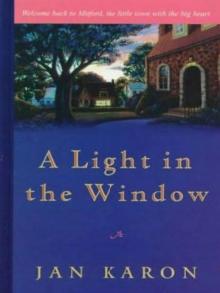 A Light in the Window
A Light in the Window Somewhere Safe With Somebody Good
Somewhere Safe With Somebody Good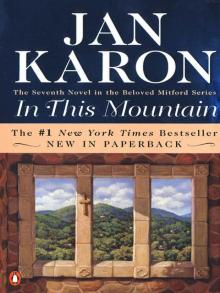 In This Mountain
In This Mountain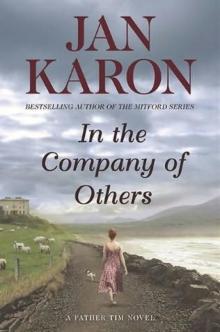 In the Company of Others
In the Company of Others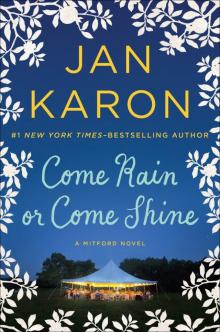 Come Rain or Come Shine
Come Rain or Come Shine To Be Where You Are
To Be Where You Are These High, Green Hills
These High, Green Hills Light From Heaven
Light From Heaven A New Song
A New Song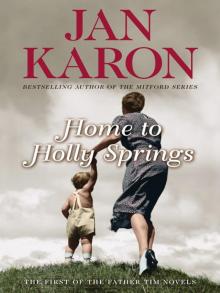 Home to Holly Springs
Home to Holly Springs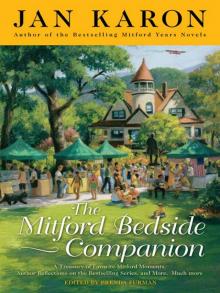 The Mitford Bedside Companion
The Mitford Bedside Companion At Home in Mitford
At Home in Mitford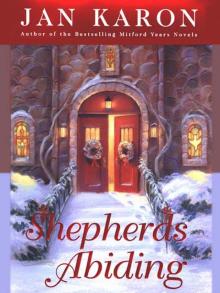 Shepherds Abiding
Shepherds Abiding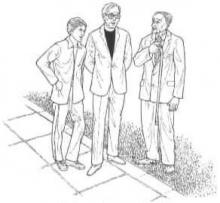 Out to Canaan
Out to Canaan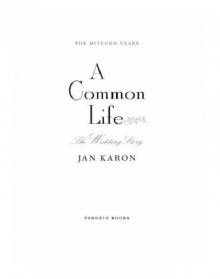 A Common Life: The Wedding Story
A Common Life: The Wedding Story Jan Karon's Mitford Years
Jan Karon's Mitford Years